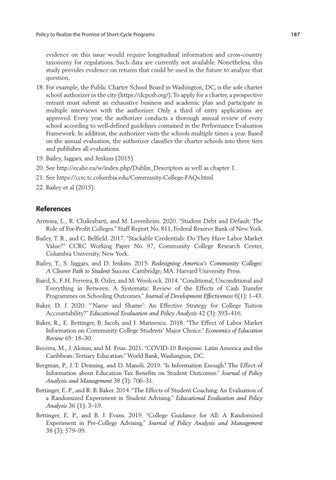Policy to Realize the Promise of Short-Cycle Programs
evidence on this issue would require longitudinal information and cross-country taxonomy for regulations. Such data are currently not available. Nonetheless, this study provides evidence on returns that could be used in the future to analyze that question. 18. For example, the Public Charter School Board in Washington, DC, is the sole charter school authorizer in the city (https://dcpcsb.org/). To apply for a charter, a prospective entrant must submit an exhaustive business and academic plan and participate in multiple interviews with the authorizer. Only a third of entry applications are approved. Every year, the authorizer conducts a thorough annual review of every school according to well-defined guidelines contained in the Performance Evaluation Framework. In addition, the authorizer visits the schools multiple times a year. Based on the annual evaluation, the authorizer classifies the charter schools into three tiers and publishes all evaluations. 19. Bailey, Jaggars, and Jenkins (2015). 20. See http://ecahe.eu/w/index.php/Dublin_Descriptors as well as chapter 1. 21. See https://ccrc.tc.columbia.edu/Community-College-FAQs.html 22. Bailey et al (2015).
References Armona, L., R. Chakrabarti, and M. Lovenheim. 2020. “Student Debt and Default: The Role of For-Profit Colleges.” Staff Report No. 811, Federal Reserve Bank of New York. Bailey, T. R., and C. Belfield. 2017. “Stackable Credentials: Do They Have Labor Market Value?” CCRC Working Paper No. 97, Community College Research Center, Columbia University, New York. Bailey, T., S. Jaggars, and D. Jenkins. 2015. Redesigning America’s Community Colleges: A Clearer Path to Student Success. Cambridge, MA: Harvard University Press. Baird, S., F. H. Ferreira, B. Özler, and M. Woolcock. 2014. “Conditional, Unconditional and Everything in Between: A Systematic Review of the Effects of Cash Transfer Programmes on Schooling Outcomes.” Journal of Development Effectiveness 6(1): 1–43. Baker, D. J. 2020. “’Name and Shame’: An Effective Strategy for College Tuition Accountability?” Educational Evaluation and Policy Analysis 42 (3): 393–416. Baker, R., E. Bettinger, B. Jacob, and I. Marinescu. 2018. “The Effect of Labor Market Information on Community College Students’ Major Choice.” Economics of Education Review 65: 18–30. Becerra, M., J. Alonso, and M. Frias. 2021. “COVID-19 Response. Latin America and the Caribbean: Tertiary Education.” World Bank, Washington, DC. Bergman, P., J. T. Denning, and D. Manoli. 2019. “Is Information Enough? The Effect of Information about Education Tax Benefits on Student Outcomes.” Journal of Policy Analysis and Management 38 (3): 706–31. Bettinger, E. P., and R. B. Baker. 2014. “The Effects of Student Coaching: An Evaluation of a Randomized Experiment in Student Advising.” Educational Evaluation and Policy Analysis 36 (1): 3–19. Bettinger, E. P., and B. J. Evans. 2019. “College Guidance for All: A Randomized Experiment in Pre-College Advising.” Journal of Policy Analysis and Management 38 (3): 579–99.
187

